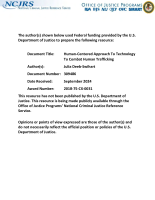University of California
GENETIC MARKERS IN HUMAN SEMEN - 2 - QUANTIFICATION OF POLYMORPHIC PROTEINS
Using Intelligence Analysis to Understand and Address Fentanyl Distribution Networks in America’s Largest Port City
An assessment of scientific and technical aspects of closed investigations of canine forensics DNA - case series from the University of California, Davis, USA
The Impact of False or Misleading Forensic Evidence on Wrongful Convictions
Body Fluid Identification and Classification
Defining and Studying Elder Abuse Polyvictimization
NIJ Social Science Analyst Yunsoo Park shares her knowledge about elder abuse, a widespread issue in the U.S. and around the world, particularly polyvictimization — the experience of a range of different types of abuse and maltreatment. As much as 11% of community-residing older adults experienced some form of abuse or mistreatment in the past year. Yunsoo discusses risk factors, difficulties in defining and studying elder abuse polyvictimization, and strategies for intervention and prevention. Stacy Lee Reynolds, a Communications Assistant with NIJ, hosts.
NIJ Awards Over $11 Million to Support Forensic Science Research and Development in 2022
On September 30, 2022, NIJ announced $11.6 million in funding to support 23 projects under the “NIJ FY22 Research and Development in Forensic Science for Criminal Justice Purposes” solicitation. Through its research and development grant funding, NIJ continues to advance the speed, accuracy, and reliability of forensic analysis, which ultimately bolsters the...
System Dynamics Simulation Model of Cocaine Prevalence
Learning from Doing Evaluating the Effectiveness of the Second Chance Act Grant Program
Reauthorized in 2018, the Second Chance Act (SCA) aims to reduce recidivism and improve outcomes for people returning from state and federal prisons, local jails, and juvenile facilities through the provision of federal grants. During this panel, National Institute of Justice-funded researchers will detail two ongoing evaluations of the SCA grant program:
- An evaluation of the effectiveness of the SCA grant program per Title V of the First Step Act.
- A longitudinal examination of the long-term impacts of the SCA program.
See the YouTube Terms of Service and Google Privacy Policy
Use of Genetically Variant Peptides to Statistically Estimate the Genetic Background of Hair Shafts
Letter to the Editor - A Contribution to Contextual Information Management in Bloodstain Pattern Analysis: Preliminary Idea for a Two-Step Method of Analysis
THF Co-solvent Pretreatment Prevents Lignin Redeposition from Interfering with Enzymes Yielding Prolonged Cellulase Activity
NIJ-Funded Research on Firearms Violence in Urban Cities Advancing Scientific Evidence to Inform Practice
In this full thematic panel, renowned experts will present a series of papers summarizing the newest findings of NIJ-funded research projects on criminal offenses with firearms in urban areas. Researchers used various criminological and other theories, including routine activity theory, socio-ecological and socio-environmental perspectives, and advanced mixed-study methods, including surveys and spatio-temporal designs, to produce scientific evidence to inform practice.
See the YouTube Terms of Service and Google Privacy Policy
Booker and Beyond: Analyzing Sentencing Reform and Exploring New Research Directions
NIJ Funded Research on Firearms Violence in Urban Cities: Advancing Scientific Evidence to Inform Practice
Elucidation of familial relationships using hair shaft proteomics
Naturalization of the Microbiota Developmental Trajectory of Cesarean-born Neonates after Vaginal Seeding
Can Jury Instructions Have an Impact on Trial Outcomes?
Dual System Youth: At the Intersection of Child Maltreatment and Delinquency
Across the country, child welfare and juvenile justice systems now recognize that youth involved in both systems (i.e., dual system youth) are a vulnerable population who often go unrecognized because of challenges in information-sharing and cross system collaboration. In light of these challenges, national incidence rates of dual system youth are not known.
See the YouTube Terms of Service and Google Privacy Policy




